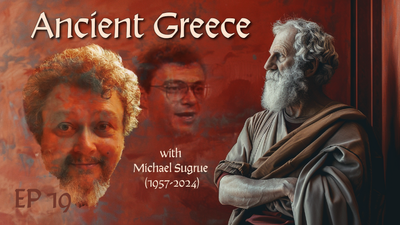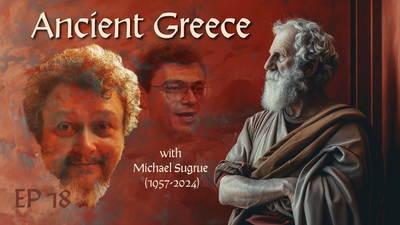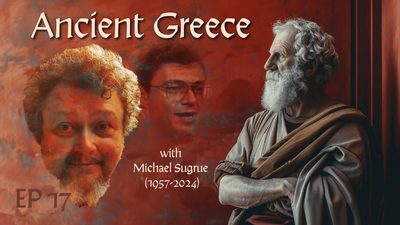This week’s focus is on the Socratic method of questioning, which forms the backbone of Plato’s dialogues and remains vital in modern philosophical and educational practices. Socrates used this method not only to reveal the assumptions held by others but also to guide them to a deeper understanding of complex ideas. His approach wasn’t about providing answers; it was about framing questions that compelled reflection, ultimately leading to a more profound engagement with the subject.
For instance, in Meno, Socrates challenges Meno’s initial definition of virtue by systematically exposing its inconsistencies. He likens Meno’s confusion to a kind of intellectual paralysis, which Socrates metaphorically refers to as “being numbed by the torpedo fish.” This vivid imagery captures the discomfort that often accompanies deep questioning—a discomfort that propels us to think more critically about our beliefs and assumptions.
Plato’s approach through Socrates reflects an educational journey that invites individuals to actively participate in discovering truths, rather than passively receiving them. It’s a journey that encourages curiosity and resilience in facing intellectual challenges. As readers, we can imagine ourselves engaging in these timeless dialogues, questioning our own understanding in the spirit of Socratic inquiry.
From the Archives of Ancient Greece: Featuring Dr. Michael Sugrue
Dr. Michael Sugrue offers a compelling analysis of the Socratic method in his discussions on Plato’s Meno. He emphasizes that the purpose of Socratic questioning is not simply to dismantle an argument but to expose the limits of one’s knowledge. Sugrue describes this as a "necessary confrontation" with ignorance, a critical step toward genuine learning. According to Sugrue, Socratic dialogue embodies a balance between challenge and humility—a recognition that genuine understanding begins with acknowledging what we do not know.
Consider Sugrue’s interpretation of the dialogue where Socrates demonstrates the theory of recollection with Meno’s slave boy. By asking simple questions, Socrates leads the boy to recognize geometric truths independently, illustrating the belief that knowledge is already present within us, waiting to be uncovered. Sugrue’s insight here is that the Socratic method is not merely about leading others to conclusions; it’s about awakening their innate capacity to discover truths for themselves.
Sugrue’s reflections encourage us to see dialogue as a shared journey of discovery, where both teacher and student are equally committed to the pursuit of wisdom. This vision of collaborative inquiry aligns beautifully with the community spirit fostered at planksip.org, where participants are invited to personify Plato’s legacy by embracing the art of questioning.
Insights from the Dialogues: Quoting Plato
Plato’s Meno provides a fascinating illustration of the Socratic method at work. In a key passage (80d-86d), Socrates challenges Meno’s understanding of virtue by methodically questioning his definitions. Rather than accepting Meno’s initial assertions, Socrates persistently explores the assumptions behind them, leading Meno into a state of perplexity—a necessary precursor to deeper insight.
Through these questions, Socrates exposes contradictions and gaps in Meno’s reasoning. For example, when Meno asserts that virtue is the ability to rule over people, Socrates asks whether this definition applies to children and slaves as well. This simple yet incisive question forces Meno to reconsider his definition and reflect on what virtue truly means.
This dialogue offers a powerful lesson: true understanding often begins when we are willing to question our most firmly held beliefs. It invites readers to practice this art of questioning in their own lives, encouraging a spirit of inquiry that seeks not just answers but deeper connections with fundamental truths.
Chance and Fate: Exploring Ancient Games
The art of questioning, much like the ancient games of chance played with dice or knucklebones, involves a delicate interplay of skill and uncertainty. Just as players must accept the unpredictable outcomes of each roll, engaging in philosophical dialogue requires embracing the uncertainties that come with questioning deeply held beliefs. This analogy resonates with the nature of dialectic, where each question opens new possibilities and each answer reveals new avenues of inquiry.
In ancient Greece, games like astragali (knucklebones) were often linked to rituals of divination, reflecting the belief that fate played a role in human affairs. In the same way, Socratic questioning can be seen as a ritualistic attempt to engage with the unknown, confronting uncertainties in the hope of revealing deeper truths. As Socrates demonstrated, the courage to embrace this uncertainty is essential in the pursuit of wisdom.
Explore the Mystical World of Astraguli: Ancient Games of Chance with Cultural Significance.
By reflecting on these ancient games and their symbolic significance, we are reminded that questioning is not just an intellectual exercise—it’s an existential one. It calls us to confront the mysteries of life and our place within it, much like the ancient Greeks did in their rituals of fate.
Virtues Revisited: Practical Lessons for Today
This week’s focus on the art of questioning invites us to revisit the virtue of prudence. Prudence, in its classical sense, refers to the capacity for sound judgment and discernment. It is the virtue that allows us to navigate complexity and make wise choices amid uncertainty. In the context of Socratic questioning, prudence is what enables us to ask the right questions and consider the implications of our assumptions critically.
In our contemporary world, prudence remains a vital virtue, especially in an age characterized by rapid change and information overload. By embracing the practice of questioning, we cultivate the habits of reflection and discernment that are essential for making informed decisions in both personal and public life.
Through these reflections, readers are encouraged to engage with the community at planksip.org, where they can explore these themes further and personify the ideals of Plato’s legacy. There, participants are invited to embody the virtues of inquiry, dialogue, and prudence in their own pursuit of wisdom.
Engage with Us: Reader’s Corner
We invite you to share your reflections on the role of questioning in your own journey. Have there been moments when a well-placed question shifted your perspective or led you to a deeper understanding? How has the art of questioning shaped your pursuit of knowledge or your relationships with others? Share your insights with us at planksip.org, and join a community dedicated to the pursuit of wisdom.
Selected reflections will be featured in next week’s newsletter, where we will continue to explore the enduring legacy of Plato’s dialogues. Your contributions are a vital part of this ongoing conversation, enriching the dialogue with new perspectives and insights.
Closing Reflection: Socrates’ Enduring Legacy
As we reflect on Socratic questioning, let us remember that this method is not just about challenging others—it’s about challenging ourselves. It is an invitation to remain open to new possibilities, to embrace uncertainty, and to recognize that the pursuit of wisdom is a lifelong journey. In the words of Socrates, “The unexamined life is not worth living,” reminding us that true wisdom lies not in having all the answers but in the courage to keep asking questions.
At planksip.org, we continue this tradition by fostering a space where philosophical inquiry thrives and where Plato’s personified legacy inspires us to imagine new ways of engaging with the world. Join us in embracing this ideal and contributing to a community that values the art of questioning as a pathway to wisdom.

Plato Re-Imagined
This course offers 32 comprehensive lectures exploring most of Plato's dialogues. These lectures guide students toward a consilient understanding of the divine—a concept that harmonizes knowledge across disciplines and resonates with secular and religious leaders. As a bonus, Lecture #33 focuses on consilience, demonstrating how different fields of knowledge can converge to form a unified understanding.






